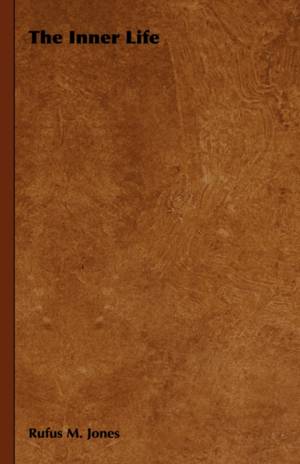
- Retrait gratuit dans votre magasin Club
- 7.000.000 titres dans notre catalogue
- Payer en toute sécurité
- Toujours un magasin près de chez vous
- Retrait gratuit dans votre magasin Club
- 7.000.0000 titres dans notre catalogue
- Payer en toute sécurité
- Toujours un magasin près de chez vous
Description
THE INISTIR LIFE by RUFUS M. JONES. Originally published in 1917. INTRODUCTION: THERE is no inner life that is not also an outer life. To withdraw from the stress and strain of practical action and from the complication of problems into the quiet cell of the inner life in order to build its domain undisturbed is the sure way to lose the inner life. The finest of all the mystical writers of the fourteenth century the author of Theologia Ger manica knew this as fully as we of this psychologically trained generation know it. He intensely desired a rich inner life, but he saw that to be beautiful within he must live a radiant and effective life in the world of men and events. I would fain be, he says, to the eternal God what a mans hand is to a man i. e. he seeks, with all the eagerness of his glowing nature, to be an efficient instrument of God in the world. In the practice of the presence of God, the presence itself becomes more sure and indubitable. Re ligion does not consist of inward thrills and private enjoyment of God it does not terminate in beatific vision. It is rather the joyous business of carrying the Life of God into the lives of men of being to the eternal God what a mans hand is to a man. There is no one exclusive way either to the supreme realities or to the loftiest experiences of life. The way which we individuals select and proclaim as the only highway of the soul back to its true home turns out to be a revelation of our own private selves fully as much as it is a revelation of a via sacra to the one goal of all human striving. Life is a very rich and complex affair and it forever floods over and inundates any feature which we pick out as essential or as pivotal to its consummation. God so completely over arches all that is and He is so genuinely the fulfillment of all which appears in complete and potential that we cannot conceivably insist that there shall be only one way of approach from the multiplic ity of the life which we know to the infinite Being whom we seek. Most persons are strangely prone to use the principle of parsimony. They appear to have a kind of fascination for the dilemma of either-or alternatives. Faith or works is one of these great historic alternatives. But this cleavage is too artificial for full-rounded reality. Each of these halves cries for its other, and there cannot be any great salvation until we rise from the poverty of either half to the richness of the united whole which includes both ways. So, too, we have had the alternative of outer or inner way forced upon us. We are told that the only efficacious way is the way of the cross, treated as an outer historical transaction and we have, again, been told that there is noway except the inner way of direct ex perience and inner revelation. There are those who say, with one of George Chap mans characters Ill build all inward not a light shall ope The common out-way. Ill therefore live in dark and all my light Like ancient temples, let in at my top. Over against the mystic who glories in the infinite depths of his own soul, the evangelical, with excessive humility, allows not even a spark of native grandeur to the soul and denies that the inner way leads to anything but will-o-the-wisps. This is a very inept and unnecessary halving of what should be a whole. It spoils religious Hfe, somewhat as the execution of Solomons proposal would have spoiled for both mothers the living child that was to be divided. Twenty five hundred years ago Heraclitus of Ephesus declared that there is a way up and a way down and both are one...
Spécifications
Parties prenantes
- Auteur(s) :
- Editeur:
Contenu
- Nombre de pages :
- 220
- Langue:
- Anglais
Caractéristiques
- EAN:
- 9781443722513
- Date de parution :
- 04-11-08
- Format:
- Livre relié
- Format numérique:
- Genaaid
- Dimensions :
- 140 mm x 216 mm
- Poids :
- 426 g

Les avis
Nous publions uniquement les avis qui respectent les conditions requises. Consultez nos conditions pour les avis.






